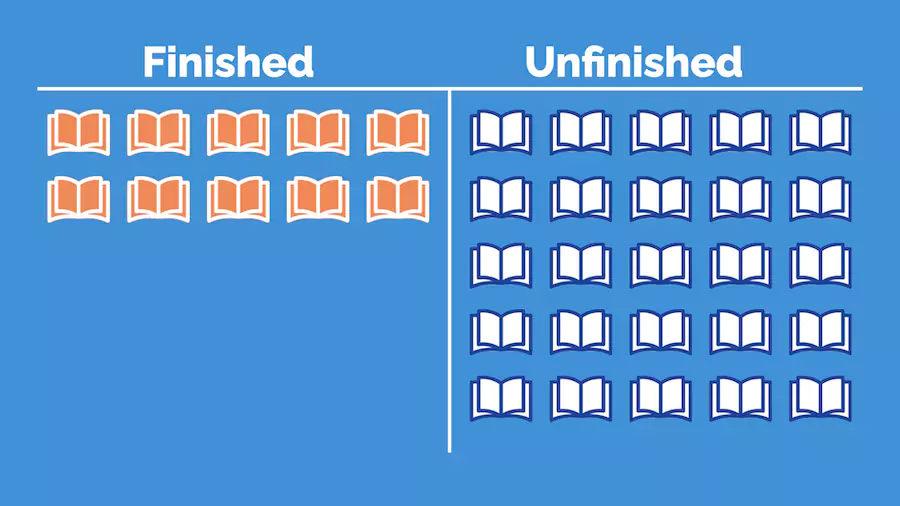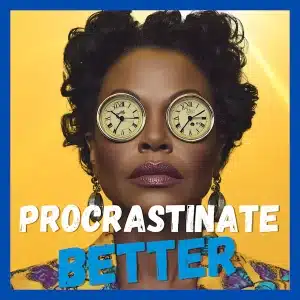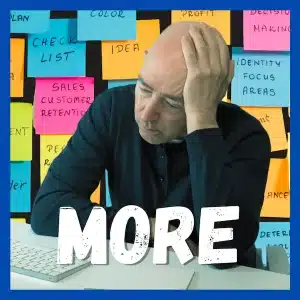You’ve started writing your book and now you don’t think you can finish it. How do you keep going?
This is the challenge that every author faces at some point in their book. How do you keep going and finish writing your book?
I’m probably better qualified than most people to answer this question. I’ve written and finished ten books. But I’ve also started and not finished more than 25 other books. I know both sides of this equation – how to finish the book and how not to finish the book.
In this post, I’ll share the surprisingly simple secret to finish writing your book. It’s more obvious than you might realise. It helped me finish writing four books in two years.
My Personal Cost of Not Finishing
In my book, Done, I tell th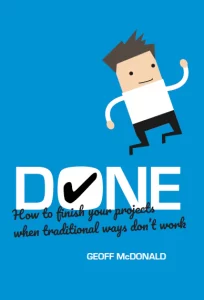
It came to a head when I partnered with a good friend on a new business venture.
I was really excited about what we were working on and my partner who was managing the sales side of things was telling me of the great results we were achieving. Based on this, I shut down my other business and was relying on the money from our new venture.
But even though he kept telling me about our great sales, there was never ever any money. He would say the money was coming but it never did.
Eventually, I worked out that he was lying to me. There were no sales and there was no money.
And that meant I was broke. I couldn’t pay my rent; I couldn’t pay my bills and I could barely pay for food. And worse, I was depressed. You know you’re in trouble when it’s 11 o’clock in the morning and you’re still in bed trying to hide from the world.
While my business partner had clearly done the wrong thing, I eventually realised that I had dug this big hole for myself. By not finishing my projects over 25 years I hadn’t built a reserve of cash flow from all my effort. It was the lack of leverage that made it so much harder for me to get out of my cash flow hole.
Three Typical Costs of Not Finishing
There are three costs to not finishing.
- Regret – First is the regret you have when you look back and see the missed opportunity. It’s when you say, ‘If only I had…’ That’s depressing.
- Sunk Cost – The second cost of not finishing is the sunk cost. By not finishing my books I had nothing to show for all the time, effort, and energy I had put into half-writing them.
- Lost Leverage – The third is lost leverage. For me, had I finished my books, I would have had a whole bunch of books that I could use to be earning me money while I write my next book. Plus, your book is a great way to demonstrate your expertise. Without it, what opportunities will you miss out on?
How did I Turn This Around?
What turned all this around? How did I go from consistently not finishing my books to consistently finishing them?
I turned to my strength in researching and finding patterns. And this is where I found the surprisingly simple secret to finishing your book.
The Number One Piece of Advice
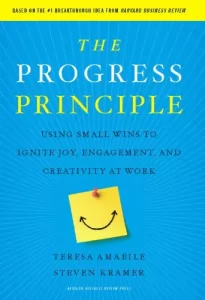
The five things were…
- Recognition
- Incentives and Rewards
- Interpersonal Support
- A sense of Progress, and
- Clear Goals
If you had to pick the one factor that correlated to the highest level of motivation, which one would you choose?
Drum roll, please… The answer is a sense of progress. If we feel like our efforts are making a difference, we’re more likely to keep going. And the opposite is also true. We lose motivation when we feel like we are not making progress. (Professors Amabile and Kramer wrote about their work in their book The Progress Principle.)
A Game Plan to Write a Book
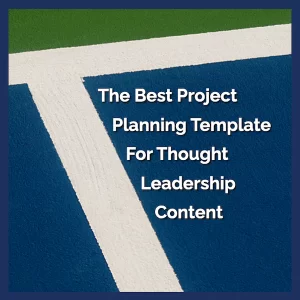
(I also used the Game Plan framework in the post, The best project planning template for thought leadership content.)
There are four parts to a good game plan.
- How do you win?
- How are you going to keep score?
- What are the rules of the game?
- What actions do you need to take to win?
In the previous post, Answer this Before you Start Writing Your Book, I talked about the first part – defining how you win. This is the second post in that four-part series.
And the key to finishing your book and other projects is to keep score – to measure and record your progress. This is the single best way to maintain your motivation for long enough to finish writing your book.
It’s a simple secret that has transformed my book writing. Once I realised this, I wrote four books in the Done series in less than two years: Done, Weekly Done, Weekly Done 2 and The Done Game Plan.
Start by Writing the Right Book
The first step for you as an author to give yourself the best chance of finishing your book is to choose the right book to write. Check out the post, 18 Different ways to write a book to help decide the right book for you.
How to Keep Score and Measure Your Progress

The second step is the design of your Game Plan. And there are two crucial things you must include here.
The first is you want to create a simple scoreboard like a game of football or tennis.
Most authors have a black-and-white scoreboard for their books.
- They start their project – no book.
- After writing for a week – no book.
- After writing for a month – no book.
- And then one day, ta-da – there’s a book.
That’s not the type of scoreboard that works. There are no milestones here to measure your progress. That’s how you fail to finish writing your book. If you do that you run the risk of running out of motivation, of stalling and not finishing your book.
You want to be able to measure your score every day you act on your book.
Don’t Count Your Words
The most popular way to record your progress when writing a book is to count the words that you’ve written. While that can work, it’s also flawed.
- First, when you start your book, do you know how many words you will finish up with?
- Second, it’s hard to plan your day when you’re counting words. For instance, one day you might write your 1000 words in half an hour. And on other days this might take you three hours.
- Third, you can count your words when you’re creating your first draft, but after that, you might be editing and even reducing the number of words you’ve written. Counting your words doesn’t work to measure your progress through the entire book project.
Why You Should Count Your Effort
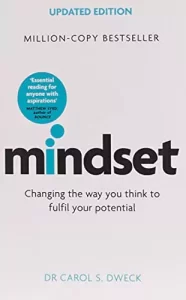
She suggests that instead of measuring your results, you’re better to measure your effort. This will build resilience and help you stick at your task for longer.
In other words, instead of counting words, count the time you spend writing your book. Then you can spend a consistent amount of time every day. Sure, some days you will get more done than others but at least you know you put your time in.
And if you want to work on both sides of this, you can count both your words and your time.
How I’m Keeping Score with my Current Book
My current book, The Ideas Architect Bible, has a unique structure that makes it easy to measure my progress. It’s based on one idea per page. And I know from experience that I can roughly create one page in one hour. This makes it easy to make progress by writing one page per day.
To keep score of your book writing progress consider counting:
- The words you have written
- The hours you have spent writing
- Or perhaps how many pages you have written as per my example.
How to Stay On Track as Your Write Your Book
The second thing to include in your Game Plan and the second part of scoring is to know whether you are on track, off track or have entirely lost track of your progress.
The solution is to connect your daily scoring to a bigger goal.
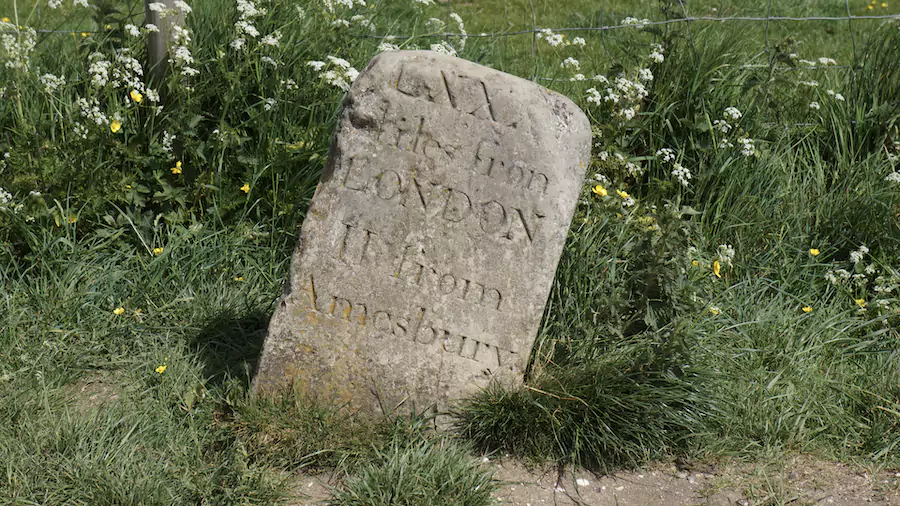
Do you know what the picture above is? It’s literally, a milestone.
In the good old days if you were walking between two major towns – like Oxford and London – stones were placed along the road telling you how many miles you must travel to reach your destination.
And you want to include milestones for your book writing project. For instance, for my book, I am planning on writing 500 pages. If I write one page per day, that’s 500 days or about 19 months to complete the book. My milestones could be complete blocks of 50 or 100 pages. Or I could simply say 30 pages every month. That’s not quite precise because not every month has the same number of days but it is probably close enough and a good way to connect my output to a regular date.
The Best Part of Keeping Score
And here’s the best part.
At the end of 30 days, you could ask me, how’s your book writing going? And I can reply, ‘I’ve written 30 pages in 30 days so I’m on track.’ Or I could say, ‘I’ve only written 20 pages in 30 days so I’m behind in my game.’
And here’s the important part, ‘I’m behind in my game so I need to work differently to catch up.’ This is how you keep yourself on track.
Imagine if you were the coach of your favourite football team and you were playing your arch-rivals in the annual grudge match. But there was no scoreboard, and you didn’t know whether your team was winning or losing. What would you do?
You really wouldn’t know what to do. You’d be coaching in the dark. You wouldn’t know whether to keep doing what you’re doing because you’re winning or to make some changes because you were losing.
(The same applies to managers – how do you know if your team are winning?)
Your scoreboard is your feedback tool. When you keep score of your progress you can make smart decisions about how to write and finish your book.

The Big Lesson Here
The big lesson here is that you will have good days and bad days writing your book.
The key, as Brendon Burchard says, is to honour the struggle. The satisfaction of writing a book is not in having the book, it’s from knowing what it took to create it.
As you write your book, notice that some days it will be easier than others. Some days it will be joyful. Some days it will be tough. Best of all, if you design your book project with progress in mind, you can manage your motivation to finish it.
More on How to Write a Book
To finish writing your book, the key to your motivation is to create a sense of progress toward your goal. The two key elements you need in your Game Plan to help with this are:
- Create a way to measure your progress and keep score
- Define milestones along the way – intermediate goals to complete during your book-writing process.
Keep ticking your scoreboard over.
If you want more on how to write your book, these three blog posts can help:
- The Best Reason to Write a Book Right Now
- Ten Book Writing Mistakes I’ve Made (Author Mistakes)
- My Best Ten Tips for Writing a Book for the First Time
How will you measure your progress and score your book-writing efforts? And what milestones will you create?

